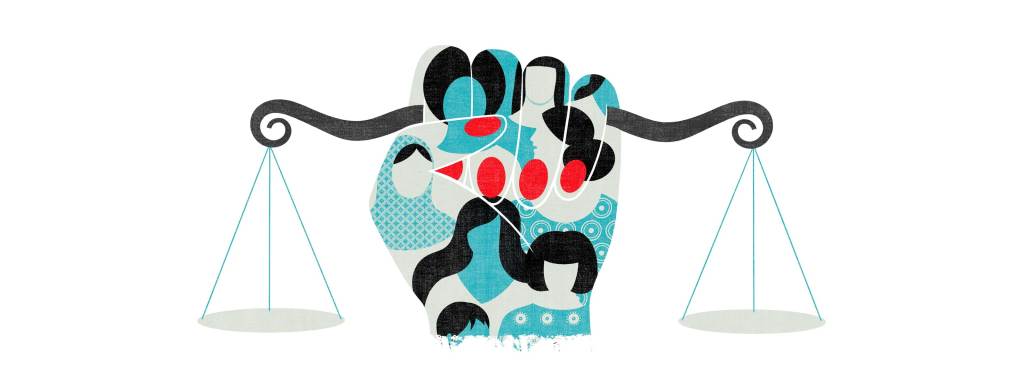
Why #MeToo matters more than ever now
In November 2017, Jennifer Glover, a 30-year-old security guard at the Nevada National Security Site—a tightly restricted Department of Energy facility where nuclear weapons are tested—was participating in a training drill when her colleagues assaulted her.
The drill was a simulated attack on the facility, and Glover’s role was to pretend to steal classified documents. The air was thick with smoke from a fog machine and ringing with the sound of simulated gunfire when Glover found herself on the ground, hit in the face with a rifle butt and handcuffed. She said she felt her fellow guards grabbing at her legs, butt and groin; one reached under her shirt and tore out her nipple ring.

This piece is part of our featured series, The Future Is Hers, celebrating the power of women and girls around the world.
It was the culmination of months of sexual harassment that Glover said began once she took the job: a high-paying, quasi-military position with a government contractor called Centerra that would both allow her to provide for her two children as a single mother and learn new skills, like tactical shooting. The daughter of a former cop and prison warden, Glover had always wanted to follow in her father’s footsteps. She went to college to study criminal justice and her career path cut straight through male-dominated fields like law enforcement and security. In her spare time, she trained with firearms and as a bodybuilder, priding herself on her toughness. When the Me Too movement began to make headlines, she’d roll her eyes, dismissing the stories as “whining and complaining.”
But when Glover began working for Centerra, which provided private security for the Nevada facility, the harassment, she said, was intense. She claims she was flashed by coworkers, propositioned by supervisors, told that co-workers were circulating her Facebook pictures and joking about which of them would get her pregnant first.
Then came the attack, which left her in shock. Sympathetic colleagues would later tell her they saw her standing silent and motionless when the fog cleared, with tears on her cheeks—something Glover said is “definitely not in my character at all.” She shook off their concern—“I didn’t want to be part of that whole eye-rolling thing that I used to do”—but, in the following weeks, she said she realized that her coworkers were laughing about what had happened, smirking when they passed her, and goading her by surrounding her truck with their vans while she was on duty.
When one called her a “whore,” she turned to charge him, but her lieutenant stopped her and insisted she file a report to management. But the first manager she spoke to sighed, saying, “I knew something like this was going to happen.”
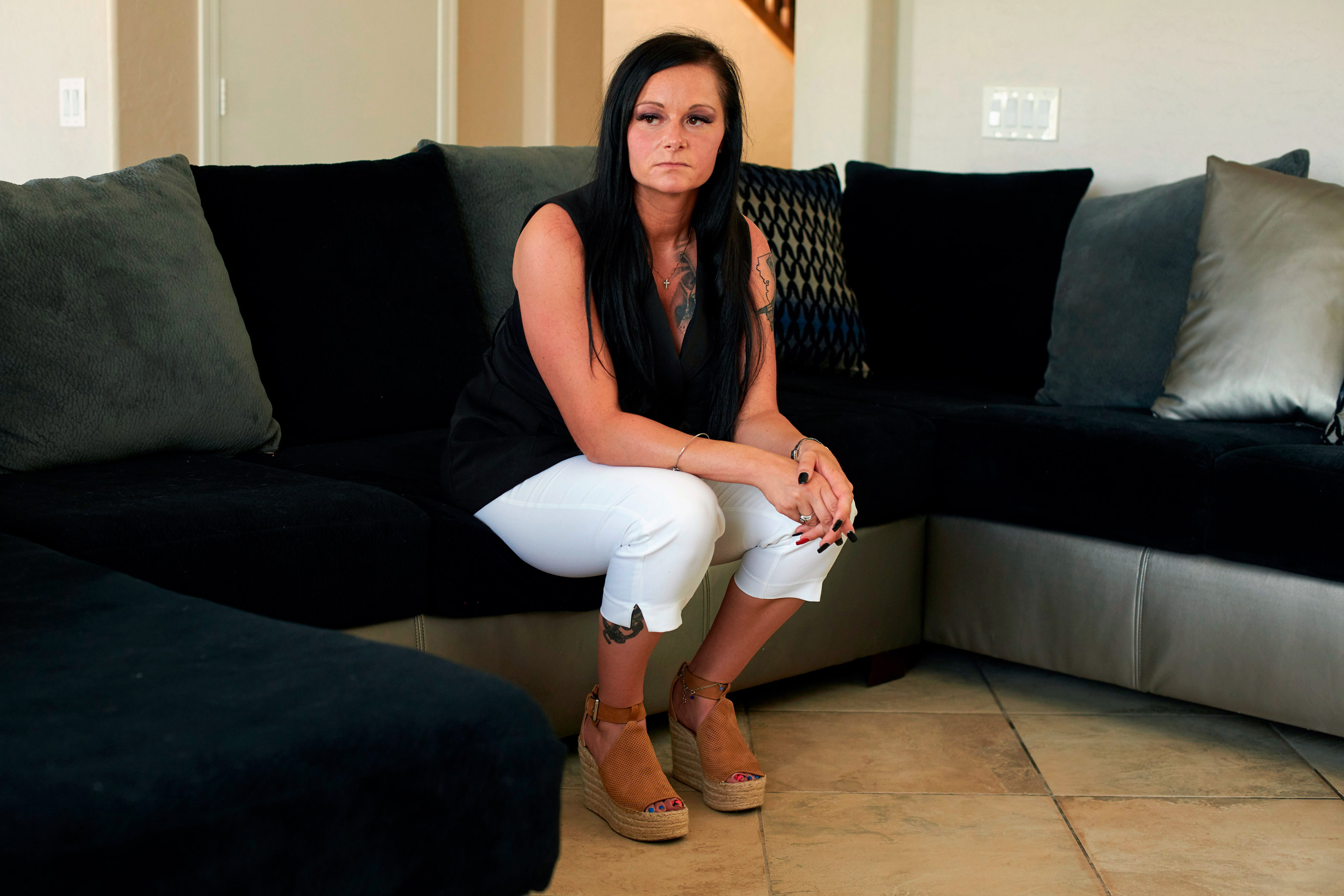
Of the roughly 200 security guards on the force, Glover estimated that only about five were women. She even watched one of her few female colleagues clean out her locker rather than deal with the harassment. An investigation was eventually launched, but Glover said she was kept in the dark and, at times, appeared to be targeted with questions about her dating life and her Facebook posts. Ultimately, the only punishment meted out was two-day suspension for two men for spreading malicious rumors.
When a new company, SOC, took over the site’s security contract, Glover told them what happened and asked to change her schedule to avoid the men who abused her. SOC denied the request. She said management also revoked her clearance to work in secure areas and stripped her of her weapon, declaring they believed she was struggling with anxiety from the attack and should undergo a psychiatric examination. Glover passed the evaluation, along with a mandated second exam, but never got her gun or old duties back. Instead, she was posted to a station reserved for new hires without security clearance and people who’d gotten in trouble.
“They put me out there to make a spectacle of me,” Glover said, “so that nobody else would stand up to them.”
Ultimately, in November 2018, a year after the attack, Glover was terminated over scheduling infractions and “hostility,” including using profanity on the job. Afterwards, a manager announced at a staff meeting that the Glover “headache” was finally over.
But before she left, her lieutenant’s wife slipped her an email address for a new legal network created specifically to support women who experienced sexual harassment and discrimination in the workplace. “She said, ‘I don’t know much about them. I don’t know if they can even help you. But at least it’s something,’” Glover recalled.
“I was emotionally exhausted and crying going to work. So I sent them an email, saying I’ve been harassed, I was assaulted, I don’t know what to do. I did everything that I should have done and it’s not stopping. I need help.”
The next morning, to her amazement, she had a response, a list of lawyers to call, and an attorney offering to fly up to Las Vegas to hear about her case.

The network Glover called is the TIME’S UP Legal Defense Fund, and its story starts further back, in the wake of the 2016 election. In early 2017, the National Women’s Law Center (NWLC)—a Ford-funded organization that has fought for gender justice and supported equity litigation and policy for decades—assembled its staff in Washington, D.C., to think through its strategy to prepare for a Trump presidency. There were substantial concerns that the incoming Trump administration would threaten civil rights and the policies meant to uphold them.
“We wanted to be ready to demonstrate that our civil rights laws had in fact not changed,” said Fatima Goss Graves, NWLC’s president and CEO. “Having a private bar [of lawyers] show up in this moment was important.” The center began recruiting a stable of lawyers around the country committed to help women, transgender and gender non-conforming individuals with potential sex discrimination cases, whether or not they took them on, to understand their rights and options. What resulted—the Legal Network for Gender Equity—would address a wide range of issues, from pregnancy discrimination to pay disparities to campus sexual assault.
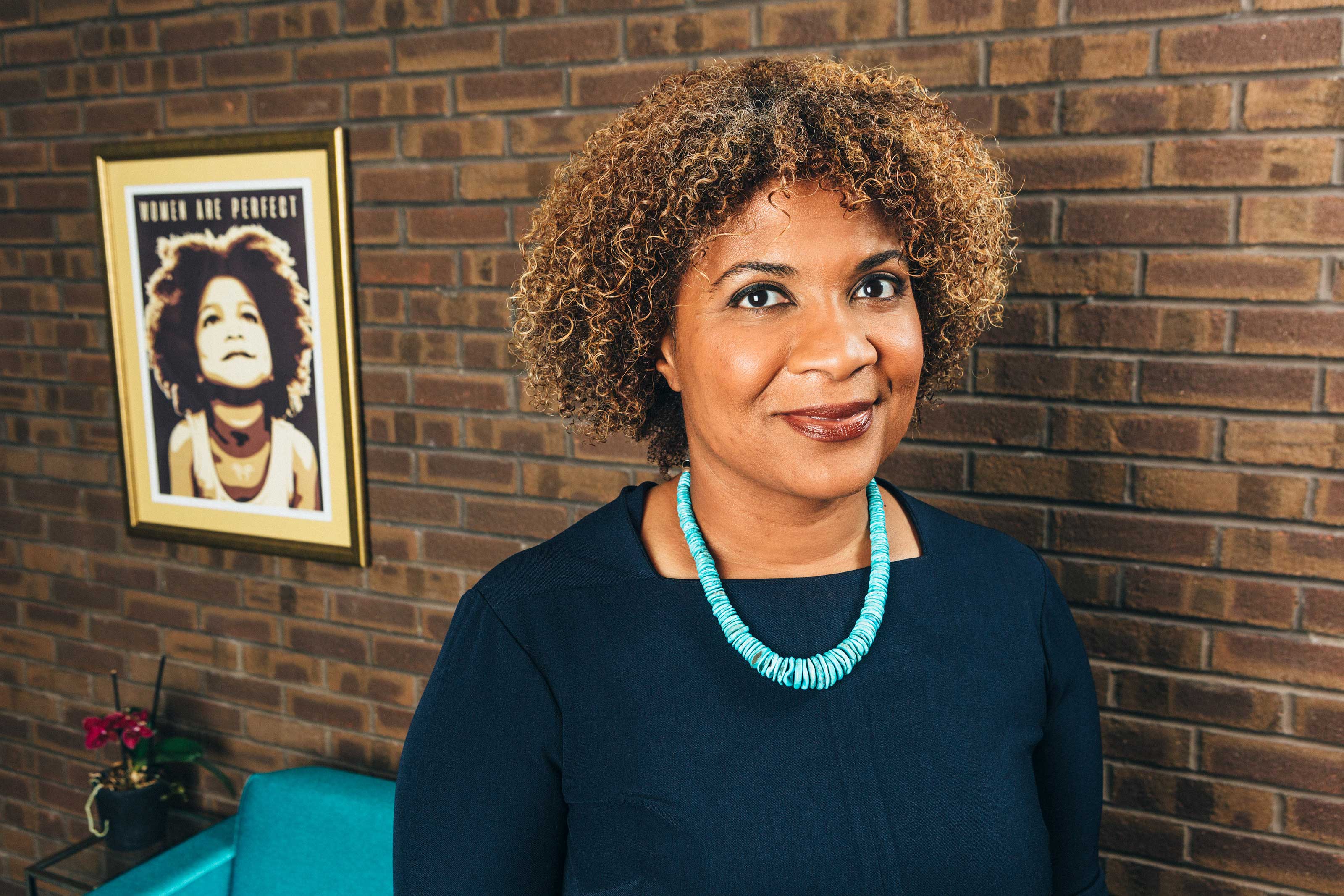
It was an ambitious project under any circumstances, but it also happened at a moment of profound transition at the National Women’s Law Center. Its two founding partners, Marcia Greenberger and Nancy Duff Campbell—who established the center in 1972 and built it into an organization behind every major legal and policy change for women in the US—retired after 45 years. Goss Graves, who had worked for the NWLC for more than a decade was chosen to take the helm.
Incidentally, in 2016, Goss Graves had joined a select task force created by the Equal Employment Opportunity Commission (EEOC) to address workplace harassment. They’d spent a year studying the issue, hearing testimony, and drafting legal and policy recommendations. “We also spent a tremendous amount of time talking about what it would take to get people to actually care about this issue,” in the face of a largely indifferent public and media landscape, Goss Graves recalled.
Then, in October 2017, just days after the NWLC publicly announced its legal network, came back-to-back bombshell investigations revealing the decades of sexual harassment and assault perpetrated by Hollywood executive Harvey Weinstein. The charges and the elevation of the Me Too movement started by activist Tarana Burke led to women across the US and the world speaking out on the harassment and discrimination they’d faced at work.
Almost immediately, NWLC’s new legal network began receiving calls, overwhelmingly concerning sexual harassment at work. “It totally shifted how we were thinking about our need to show up,” said Goss Graves. “We could have decided that we were going to spend our time holding the line.” But in an era where progressive organizations felt constantly on the defensive, fending off devastating new policy changes and trying to protect those most at risk of harm, the moment seemed to offer a new and important opportunity: to “dream for the future, and launch something visionary and proactive.”
As the Me Too movement went viral, things moved quickly. Tina Tchen, a lawyer and Michelle Obama’s former chief of staff, contacted the NWLC to explain how activists in the entertainment industry—many gathering around the name “Time’s Up”—had begun to brainstorm how to help. “They had been gathering to determine what they could do to drive change and pretty quickly assessed that people were going to need attorneys,” said Goss Graves. “People had been saying ‘Me Too,’ and telling their stories in and out of the entertainment industry, and the usual tactics of bullying and harassment, including legal bullying, were starting to rear their heads, as people were threatened with lawsuits to try to silence this movement back into the shadows.”
The Time’s Up activists suggested that, since the NWLC already had a network of lawyers committed to gender equity cases, the center should take on the fruits of their fundraising to help finance sexual harassment cases across all industries. The idea for the TIME’S UP Legal Defense Fund was born, and Tchen, who became president and CEO of the fund in 2019, told the NWLC to ready themselves for a broader launch at the Golden Globes, then little more than a month away.
“At the time, I didn’t fully understand the power of awards season,” Goss Graves said. But Tchen had impressed upon her the importance of the moment to raise money for the fund and call attention to the cause. When the night came around, its impact was undeniable. Leading Hollywood women clad in black arrived with activists on their arms, changing the conversation on the red carpet from talk about films and fashion to a call to end gender disparities in the industry and beyond. When Oprah Winfrey took the stage to accept the Cecil B. DeMille lifetime achievement award, she thundered for an end to a “culture broken by brutally powerful men.” She was met with a standing ovation and the next day Time’s Up dominated headlines.
Accessibility Statement
- All videos produced by the Ford Foundation since 2020 include captions and downloadable transcripts. For videos where visuals require additional understanding, we offer audio-described versions.
- We are continuing to make videos produced prior to 2020 accessible.
- Videos from third-party sources (those not produced by the Ford Foundation) may not have captions, accessible transcripts, or audio descriptions.
- To improve accessibility beyond our site, we’ve created a free video accessibility WordPress plug-in.
Accessibility Statement
- All videos produced by the Ford Foundation since 2020 include captions and downloadable transcripts. For videos where visuals require additional understanding, we offer audio-described versions.
- We are continuing to make videos produced prior to 2020 accessible.
- Videos from third-party sources (those not produced by the Ford Foundation) may not have captions, accessible transcripts, or audio descriptions.
- To improve accessibility beyond our site, we’ve created a free video accessibility WordPress plug-in.
Seemingly overnight, the effort raised $14 million, most of it from small donors and people who hadn’t traditionally given to women’s organizations. “They captured the Golden Globes, and people tuned in,” said Goss Graves. “We were reaching totally new audiences.” During the broadcast alone, the TIME’S UP Legal Defense Fund, now housed and administered at the NWLC Fund, received 200 calls—overwhelmingly from people inspired by seeing other women share their stories.
“It was a tremendous message about what was possible. And it meant that we had to get to work.”

Two years later, the TIME’S UP Legal Defense Fund has amassed $25 million in funding, built a network of more than 700 attorneys, and fielded 6,000 calls—4,000 of those related to workplace sexual harassment.
While the TIME’S UP Legal Defense Fund has represented some of the women who came forward with allegations about Weinstein, the organization’s mandate is to focus on low-wage workers like the women suing McDonald’s, whose employees have organized to protest harassment in the restaurant industry. The fund additionally focuses on cases in male-dominated industries, involving high-profile (and better-resourced) harassers, representing systemic issues, and those that introduce novel legal theories that can push case law forward, such as holding employers responsible for third-party harassment.
About two thirds of the calls the fund receives are for women in low-wage industries, and about a third are from women of color. And of the 200 cases it’s funded, about 40 percent involve low-wage workers, who face the hardest challenges coming forward. That reality reflects how the Me Too and Time’s Up movements sparked a unique moment of cross-class solidarity—memorialized in the “Dear Sisters” letter that a group of farmworkers, led by Monica Ramirez of the Alianza Nacional de Campesinas, sent to women in Hollywood after the Weinstein revelations.
Before the TIME’S UP Legal Defense Fund, said its director Sharyn Tejani, options for women who experienced workplace harassment or discrimination existed but were often inaccessible. “They could have filed a charge—well, if they knew how to do it,” said Tejani. “They could complain to their employer, if they knew how to do it.” Likewise, they could try to find a lawyer on their own, she continued, but would have found that many attorneys are reluctant to take on sexual harassment cases involving low-paid workers because they are hard to win and unlikely to result in settlements large enough to cover expenses, making it especially difficult for low-wage workers to take action. Legal aid groups help, but they face both chronic underfunding as well as limits regarding the types of case they can pursue.
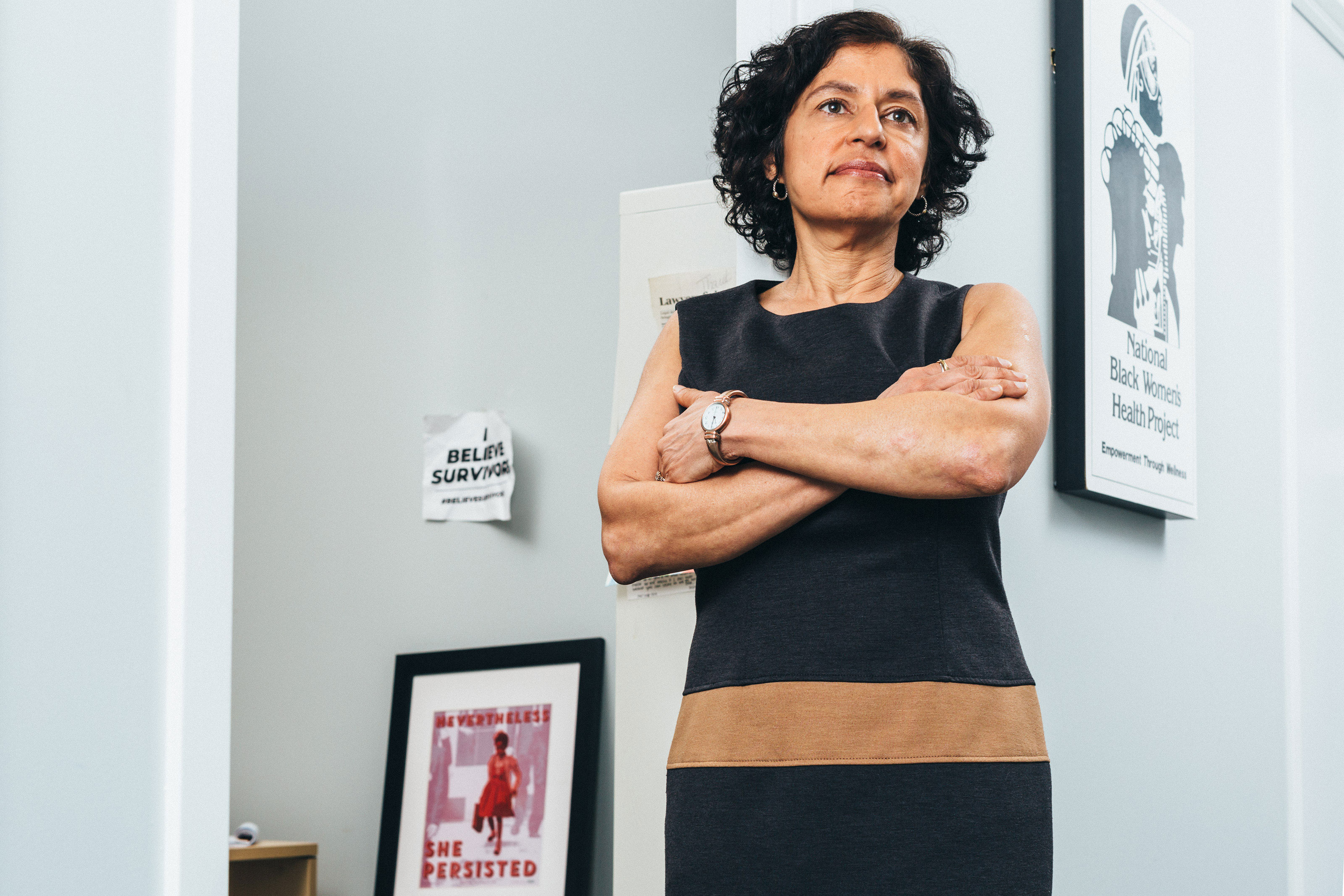
“The difference now,” said Tejani, “is it’s much easier to talk to a lawyer. It may not be the lawyer who ultimately represents you, but at least you could have someone to consult with on what your next steps can be. That’s something that existed in patches around the country, but now it exists in a national way.”
With the fund in place, survivors of workplace harassment can call in to receive free legal consultations, lawyers can apply for financial support to take on cases long ignored, and leading communications firms can help victims navigate the media and tell their stories.
TIME’S UP attorney Jay Ellwanger was inspired to join the fund’s roster of firms providing free consultations after watching Shonda Rhimes, Reese Witherspoon and other Hollywood leaders herald the movement during awards season. Within weeks, he received a call from Jennifer Glover and took her on as a client, bringing EEOC complaints against both of the companies she worked for. His firm, based in Texas, has also worked with local authorities to investigate possible criminal charges in Glover’s case. He’s even helping Glover as she participates in a film documenting her experiences. At present, the EEOC is investigating Glover’s claim against SOC, and Ellwanger’s firm is also representing a former colleague of Glover’s in federal court who alleges he was retaliated against after giving a statement supporting her account to human resources. Glover resolved her claims against Centerra after they took steps, including issuing corrective actions, to address the issues she raised.
“There are more moving parts to this case than perhaps I’ve ever experienced,” said Ellwanger.
Ellwanger’s firm has now taken on seven additional TIME’S UP referrals, ranging from two UPS drivers in Texas to a U.S. Forest Service archaeologist in Oregon to a medical sales rep in Florida, Kathryn Boston.
In 2016, Boston, then 28 years old, was excited to join a nearly all-women medical sales company and promote a device used to help patients heal after spinal surgery. Much of her job involved building relationships with surgeons to introduce them to new devices. But when Boston began working with one surgeon, whose business brought in $40-50,000 in sales each month, she quickly found herself the victim of ongoing harassment and assault.
It started, Boston said, with him guessing her and her manager’s bra sizes at a meeting, then evolved into off-color texts and unwanted back rubs. The surgeon was so persistent that Boston strategized ways to protect herself when she had to get his signature for Medicare forms, once bringing him a smoothie in the hopes it would keep his hands too full to grope. Instead, that day she said he reached down the back of her scrubs and grabbed her bare butt.
Boston was horrified but, when she called her manager, the manager laughed it off. Later the manager told Boston he’d acted similarly with her, once reaching up her dress and grabbing her groin. But the manager seemed to blame herself, for having worn a dress. When Boston appealed to other supervisors for help, they said they didn’t think it was possible to stop the surgeon.
“I was just like, I guess this is my life, I guess I have no options,” recalled Boston. “And at that time, I honestly was just ready to die.”
Boston’s only solution was to quit. In her letter of resignation, she said she hadn’t signed up to be groped. According to Boston, the company owner responded that surgeons were “wired differently” and grabbing a breast meant nothing to them. Boston said she was blamed for her clothing and for putting herself in situations where the surgeon could assault her, despite the fact that she’d been groped in a hospital hallway while wearing the common uniform of hospital scrubs.
Boston was so traumatized that she wound up leaving the field entirely, fearful that another sales position could leave her torn between losing an account and enduring assault. When she reached out to find a lawyer, one attorney told her that cases stronger than hers had failed and her PTSD, which was already bad, was bound to get worse if she pursued litigation.
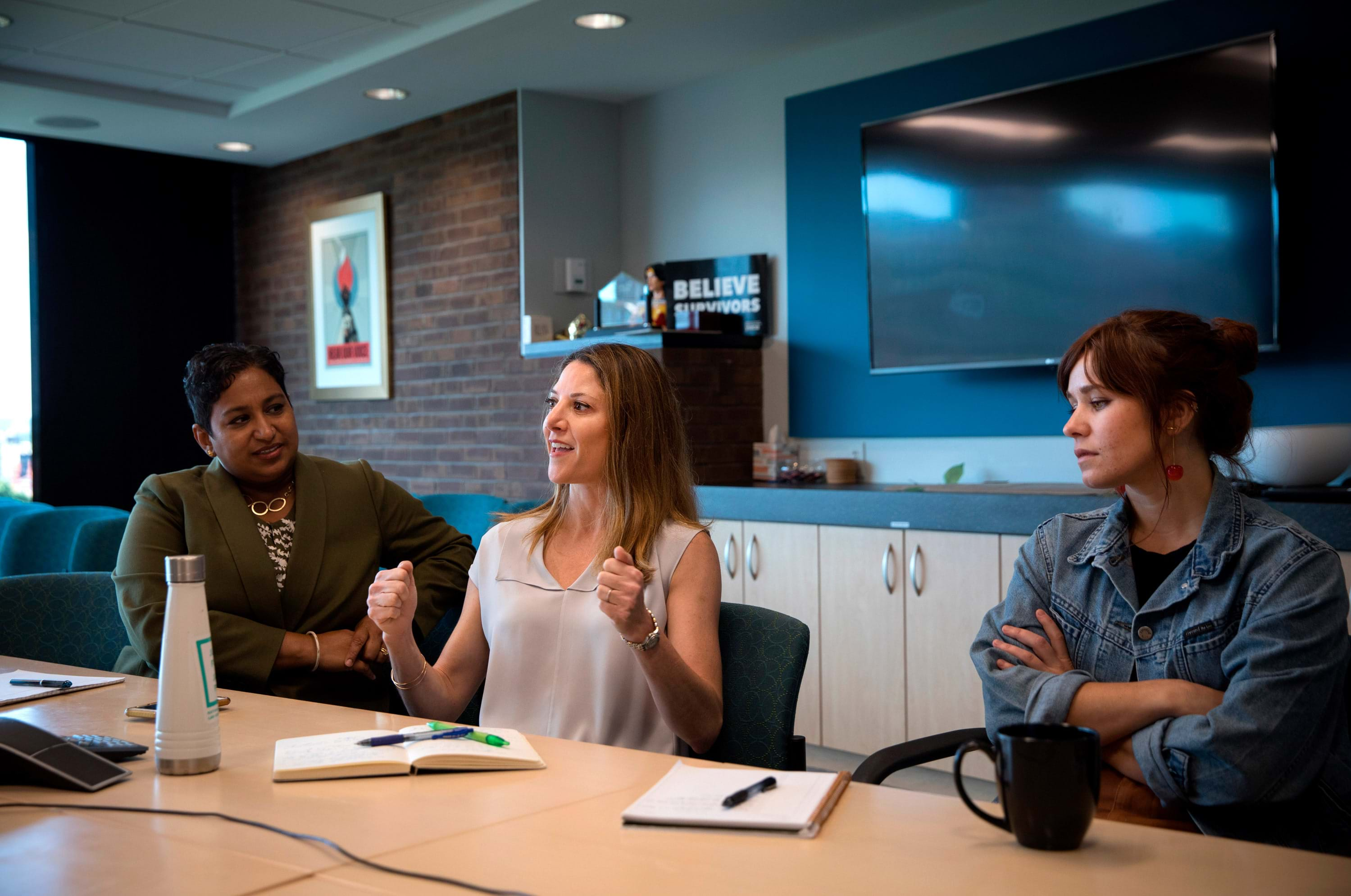
Finding the TIME’S UP Legal Defense Fund, by contrast, felt like a lifeline: providing her with a list of attorneys who’d been vetted and were dedicated to working on cases like hers. After looking up Ellwanger and his firm online, Boston felt reassured. “I felt like, OK, I can talk to this guy, he’s going to be human. It’s not going to be me giving cliff notes on sexual assault.” And when they talked, she felt confident “he had the knowledge and attitude to go after these things with an aggressive approach. I didn’t feel there was any wavering of, ‘Well, what did you do.’ It was just, ‘This is messed up and we’ll fix it.’” Boston’s case is also ongoing and set to enter discovery this spring.
Ellwanger’s firm is well-enough established that it hasn’t required financial support from the NWLC and the TIME’S UP Legal Defense fund for any of its cases. But for smaller firms, that funding can be the difference between being able to represent a client or not.
Jaribu Hill, a civil rights attorney and founder of the Mississippi Workers’ Center for Human Rights, became the first lawyer in her state to receive support from the fund. She was representing a 56-year-old woman who’d been repeatedly harassed and assaulted by her supervisor while cleaning buses for a regional transit line. When the woman, whose initials are SKN, complained, the company owner, who was friends with her harasser, declared it a “he said/she said” matter that couldn’t be resolved. Two months later, he fired SKN on the pretext that her work had gone downhill.
It was “rank, garden-variety retaliation,” said Hill, who was moved when SKN came to her and “used up a box of Kleenex” sharing what she’d experienced for more than two years. “She was harassed in a way that was so graphic and horrific,” said Hill. “She was grabbed, touched and fondled by her supervisor, and she felt she had to put up with it.
Hill’s center takes on cases for plaintiffs who can’t otherwise find attorneys, but it doesn’t collect fees or any settlements that might result; therefore, clients must be able to fund their own cases. For that reason, the center doesn’t typically accept single cases but rather encourages employees to band together to file a class complaint. But SKN’s case was so powerful, and her financial position so precarious after losing her job, that Hill asked her board to make an exception and help fundraise $25,000 to cover basic discovery.
When a friend told Hill about the Legal Defense Fund, she hesitated to apply, certain that a case with a single plaintiff in Mississippi might be considered both too minor to have impact and a lost cause given the state’s hostility to workers’ rights, particularly African American workers. But to her surprise, the fund not only met most of her initial request, but also supplemented the center’s budget when SKN’s discovery process became more involved.
“That’s how we were able to go toe-to-toe with two law firms representing the harasser and the company supervising him,” said Hill. “We were going to take the case anyway, but it surely makes a difference when all you have to worry about is the argument you’re going to make and the lawyering you’re going to do, rather than how you’ll be able to pay for it.”
With support from the fund, Hill and her partners were able to conduct deep legal research to combat the company’s claim that SKN was not an employee but a contractor ineligible for Title VII protections. They also compelled the defendants to make the astonishing claim that SKN’s work had begun to decline on the very day she filed her first EEOC complaint: an admission, Hill said, that exposed their termination of SKN as bald-faced—and illegal—retaliation. This December, two months before the case was set to go to court, the defendants offered to settle.
“There are so many women out there who have been harmed but don’t have the resources to prosecute their claims,” said Hill. “We were able to send a message in a region where often these cases don’t come to court because of the fear factor, where there are few job options so people have to stay in places where they’re being abused.”
The TIME’S UP Legal Defense Fund has awarded $750,000 in grants to 18 community outreach projects to educate low-wage workers about their rights regarding harassment and retaliation. The grants, up to $50,000 each, have supported worker-led meetings and trainings and created educational tools like webinars, videos, and even comic books that target a range of populations, from farmworkers to Walmart employees to immigrant domestic workers.

Today, the National Women’s Law Center and the TIME’S UP Legal Defense Fund are driving change for survivors well beyond facilitating individual cases or even class complaints.
In 2019, they collaborated with a number of other activists—Tarana Burke of the Me Too movement, Ai-Jen Poo of the Domestic Workers Alliance, and Mónica Ramirez of Justice for Migrant Women—to launch #MeTooVoter, an online campaign designed to pressure political leaders to put forward real solutions to address and prevent sexual violence and harassment. As part of the initiative, the center has worked closely with state legislators to rethink issues that can keep abuse hidden, such as non-disclosure agreements, expand workplace protections for contract employees and interns, and extend the statute of limitations for filing harassment and discrimination claims.
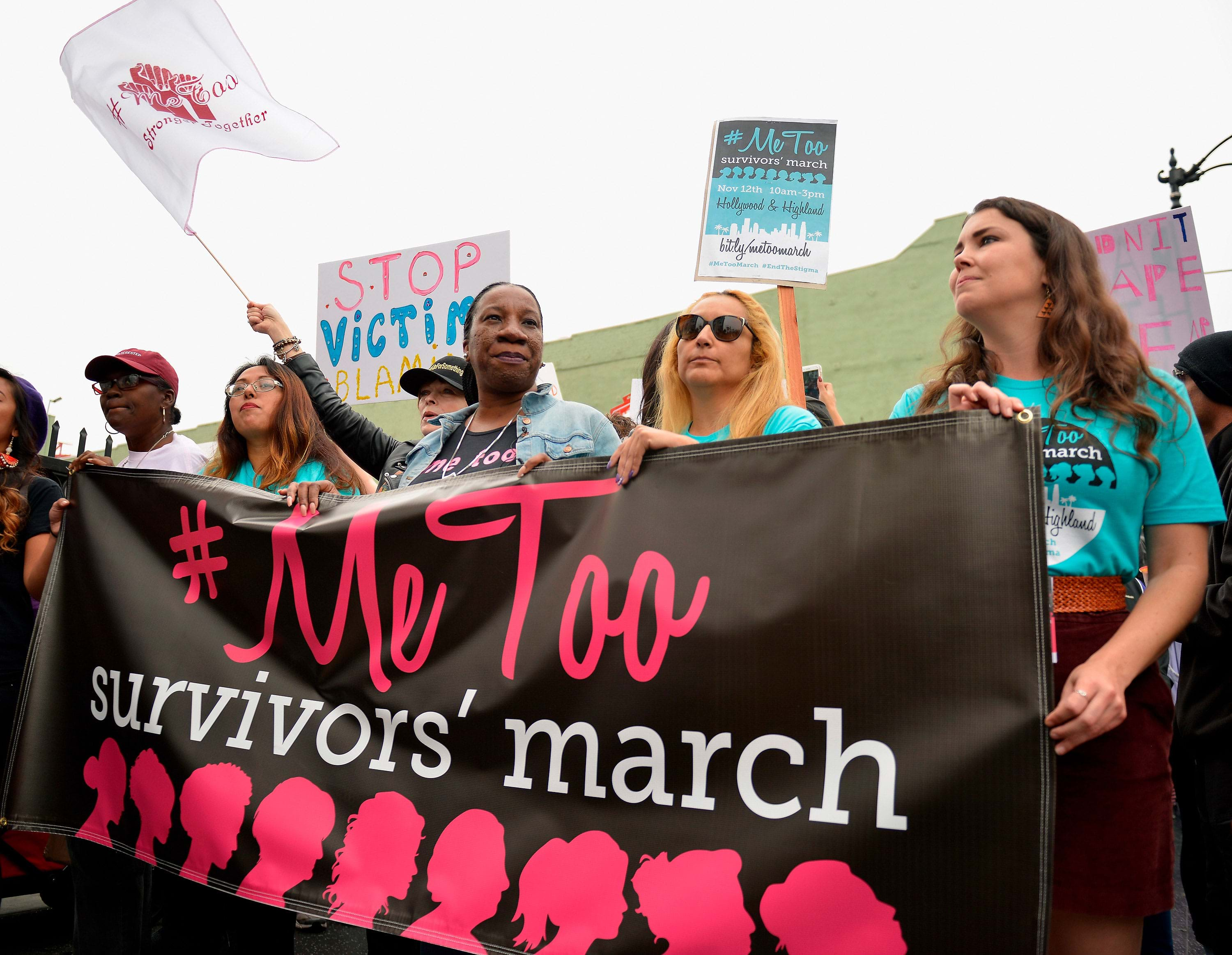
Through their advocacy, the staff has gained a disturbing overview of the prevalence of gender inequity at work. “I’ve been doing workplace discrimination for over 20 years,” said Tejani. “And I was still taken aback by how much retaliation people are facing after they come forward. It is in almost every person reaching out to us—that once they come forward, they’ve been retaliated against.”
“Another thing we all see,” Tejani continued, “is the emotional toll that sexual harassment takes on people. It’s beyond forcing people out of jobs, especially when we’re talking about low-wage workers who could be without a paycheck. The emotional toll means people think that it’s their fault and try to change what they’re doing. But, of course, it doesn’t help that you change what you’re doing because it’s not your fault. It’s about the other person’s behavior.”
What’s been most exciting to Goss Graves since stepping into her role is the federal bill introduced in the spring of 2019, the BE HEARD in the Workplace Act. If passed, the bill would extend civil rights protections from sexual discrimination and assault for all employees, regardless of their type of employment; define what conduct constitutes unlawful harassment; and promote greater transparency.
“It’s been wonderful to have a bill that says, at a federal level, that independent contractors must be covered, that all work should be safe work,” said Goss Graves. “These are things that were not on the table several years ago. But Me Too and Time’s Up have created the space for us to actually drive policy solutions that match the scope of the problem.”
When the bill was introduced, Jennifer Glover joined members of the National Women’s Law Center to lobby members of Congress for their support. She still finds herself dealing with the aftermath of what happened to her, and the fear that she’ll never be able to work in her field again—that even if she passed exams to join a police force, “all they’ll have to do is Google my name and I’ll seem like too much of a risk for them.” Sometimes she feels like veterans who spent their lives in the military, only to be left adrift when they’re suddenly discharged from service.
But then she sees the stories from the TIME’S UP Legal Defense Fund and remembers that she’s among substantial company. “When I see all these other women going through it, it almost feels like I’m in the exact same room as them, just standing there, supporting them,” she said. “And they’re supporting me too, just by knowing I’m not alone.”

This piece is part of our featured series, The Future Is Hers, celebrating the power of women and girls around the world.
